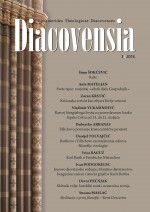FILOZOFIJA I TEOLOGIJA U GETSEMANSKOJ NOĆI LAV ŠESTOV O FILOZOFIJI FRIEDRICHA NIETZSCHEA
PHILOSOPHY AND THEOLOGY IN THE GETHSEMANE NIGHT LEV SHESTOV ON FRIEDRICH NIETZSCHE’S PHILOSOPHY
Author(s): Ivica RagužSubject(s): Ethics / Practical Philosophy, Philosophy of Religion
Published by: Katolički bogoslovni fakultet u Đakovu
Keywords: Lev Shestov; Friedrich Nietzsche; rationality; ethics; philosophy; theology; love;
Summary/Abstract: The article presents Lev Shestov’s reflections on Friedrich Nietzsche’s philosophy. We’ll hereby show in brief the novelty expressed in Shestov’s understanding of Nietzsche’s philosophy. Namely, Shestov was one of the first to notice the great significance of Nietzsche’s idea not only for the critical understanding of the European culture, philosophy and politics but also for a better understanding of theology and the Church. The Russian philosopher thinks that theology should take Nietzsche as its inspiration, particularly his criticism of the Western notion of rationality, ethics and discourse on God. In so doing Shestov didn’t fail to criticize Nietzsche’s philosophy, which will also be considered in the article. Following Shestov’s analysis of Nietzsche, we’ll evaluate and critically examine the contribution of both philosophers to the modern theology, particularly to certain theological issues, such as the relationship between the faith and reason, good and evil in the world, love for the fellow human being, and discourse on God. The actuality of their ideas in theology can be comprised in the image of the ‘Gethsemane Night’, eagerly used by Shestov himself. The term theology of ‘Gethsemane Night’ embraces the theology susceptible to suffering, to insecurity; theology never cocooned within its own systems, but one in relentless search for God, God who can only be found beyond all the human ideas and systems.
Journal: Diacovensia: teološki prilozi
- Issue Year: 18/2010
- Issue No: 1
- Page Range: 111-128
- Page Count: 18
- Language: Croatian

